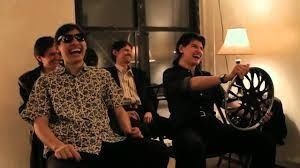How can one man, Oscar Angulo, keep his seven children locked away for years in a cramped Lower East Side apartment? This is a question not entirely answered by Crystal Moselle’s compelling but unsatisfactory documentary, The Wolfpack. The amazing story of the Angulo family, who lived in the Seward Park Extension housing project without – apparently – any complaining neighbours, keeps you hooked for 90 minutes, but you are left unconvinced by what you see. There is more to the story than Moselle is able to show us.
Nominally, the authorities – at least the Local Board of Education – were aware that the siblings were being home-schooled by their mother, Susanne, a liberal tourist who travelled to South America and came back with a Peruvian husband. Oscar was the guide who ‘knew everything’, but somewhere between marriage and having numerous children, he decided to live by a different set of rules. Oscar remained unemployed, arguing (unconvincingly in my view) that he wasn’t going to follow ‘the man’. Instead, his wife had to ensure that the kids had some sort of preparation for future life – and was paid for doing so. Home-schooling appears to be the family’s main source of income – though given that, alone among his family, Oscar went out, you can’t exactly be sure.
The nominal reason for Angulo siblings’ social incarceration was that the city was a violent and corrupting place. But the children were given movies – and a video camera – and the means by which to entertain themselves (significantly, though, no internet). They watched 5,000 movies and made their own versions of them – Reservoir Dogs, Pulp Fiction, The Dark Knight and its sequel. One of the children would type out a full length version of the script – using a 1980s typewriter of course – and the film would be made from that. Props would be made from cardboard and yoga mats.
The siblings don’t behave like a normal family – there are no violent arguments for a start. They were brought up as a tribe and given names with a religious significance: Mukunda, Govinda, Bhagavan, Narayana, Krsna, Jagadisa and the youngest Visnu, described as ‘a special little girl’ (she doesn’t appear on camera very much and appears to have learning difficulties). One reassuring normal thing did happen – Mukunda rebelled and snuck out for a walk around his neighbourhood on his own. He wore a mask to avoid being recognised by his father that naturally terrified others - Moselle simulates his wanderings. He was eventually arrested and brought home. We don’t learn how he was punished but the children are allowed out independently – indeed it was during one of their wanderings that Moselle first encountered them and explained she was a filmmaker. They consequently invited her in.
It is wrong to say that the family never left the house. One of the boys logged their trips outside. ‘One year,’ he says, ‘we went out nine times. Another year, we didn’t go out at all.’
Moselle attempts to get the father to talk, to put across his side of the story, but he is reluctant. He sits showing his profile to the camera and says very little. Susanne is more forthcoming, but is a little terrified. ‘There were more rules for me than for the children,’ she explains.
You want Moselle to confront outright the father for taking away the children’s right to clean air, socialisation and – I suspect – TV. But the children still have to live with him, so her questioning is timid. From the opening and the publicity, we are supposed to wonder whether movies are corrupting. What is the effect of enacting violent movies on the brothers’ psyches? This too is dodged.
You also want Moselle to ask: is there anything good about this way of living? You suspect the answer is no. Nevertheless, the brothers experience certain pleasures more keenly – their first trip to a movie theatre to see The Fighter, which they describe as ‘unforgettable’.
We see the brothers visiting Coney Island and feeling the sea on their feet and gradually we differentiate them. One of them is scared and teased. Their goading doesn’t become violent. We don’t see the downside of sociopathic behaviour. Susanne also speaks to her mother by phone for the first time in years and the scene is heartbreaking.
By the end, one of the brothers has a girlfriend, Chloe, and they start making their own movies which – strangely – are more like folk art than Hollywood. This suggests other influences that have been excluded from the film.
The Angulos are a great subject, but The Wolfpack is not a great movie, mainly because the fate of the siblings is uncertain and Oscar gets off lightly. Nevertheless, these long-haired sunglass-wearing boys do make an indelible impression and we’ll see more of them come Oscar time.




